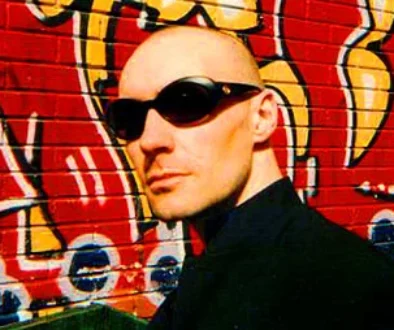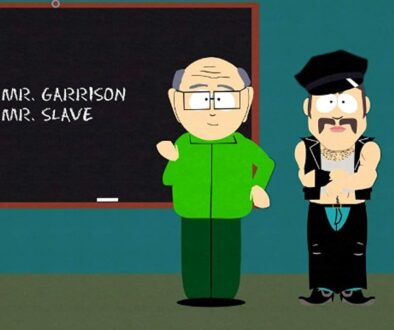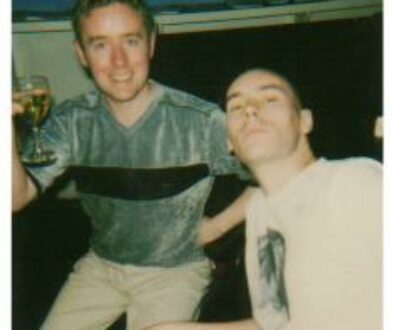On October 21st, Moore attended a Comics Mart in Glasgow. An account of this trip is printed in Mighty World of Marvel #9 under the title “I Belong to Glasgow,” alongside the Captain Britain strip “Among These Dark Satanic Mills,” a title that quotes Blake’s poem “Jerusalem” about attempting to build Jerusalem (by then imagined as Liberty, the emanation of the giant progenitor of all humanity Albion) within England via a mental war of creative effort. There he met a twenty-three year old comics fan and sometime writer named Grant Morrison.
 |
Figure 363: Grant Morrison’s last comic work prior
to his 1983 meeting with Alan Moore was an issue
of Starblazer illustrated by José Ortiz. (From Starblazer
#86, 1982) |
After a promising beginning writing and drawing avant garde stories in the new wave science fiction style and a superhero strip for his local paper, as well as a couple of stories in the space action digest Starblazer, Morrison had not published a comic in a year, and was at the time more interested in a music career, but was also active in the fanzine scene, and gave Moore a copy of his fanzine Bombs Away Batman, which contained both some positive reviews of Moore’s comics work and an interview with Morrison’s band, The Mixers, in which Morrison asserts Aleister Crowley as one of his influences while one of his bandmates cites Jerry Cornelius.
Moore’s account of the event in “I Belong To Glasgow” is primarily a glowingly comedic take in which he goes on for several paragraphs suggesting that he was only at the event because he was bribed and making fairly generic if well-executed jokes at the expense the Scottish (“While incest, murder and cannibalism have been outlawed for centuries in our own land, in Scotland they are still very much a part of everyday family life”) before settling into the meat of the piece in which he praises “the level of friendliness that we encountered,” a paragraph about Bob Napier’s AKA fanzine, and the declaration that “we had an incredible time” in Glasgow. Neither Grant Norrison nor his fanzine are mentioned at all.
 |
Figure 364: An issue of Grant Morrison’s fanzine
Bombs Away Batman |
Morrison’s aim in bending Moore’s ear was presumably related to the fact that Moore was then writing the Fanzine Reviews column for The Daredevils, and thus had the potential of giving Morrison’s work a publicity boost at a period when he was beginning to transition from a music career back to trying to make it in comics. This never happened, although it is worth noting that Moore was transitioning away from Fanzine Reviews even as Morrison slipped him a copy of Bombs Away Batman. Beyond that, the two, from fleeting third party accounts, had a relatively substantial conversation, with Moore giving Morrison various bits of advice and guidance. This is neither unexpected nor particularly notable – much as Moore grew to dislike the convention scene, his generosity with fans is well documented. His apparent lack of memory of the encounter (Moore only remembers meeting Morrison once, at a dinner event after a signing – Morrison dates that encounter to 1987) is unsurprising, as for Moore someone giving him a fanzine and bending his ear for advice about the comics industry was by this time a routine experience. For Morrison, on the other hand, it was clearly not routine – Morrison would rapidly begin establishing a comics career almost precisely according to the path Moore had taken up to the point of their meeting, and this conversation in which Moore gave him advice was almost certainly tremendously influential.
But even though that October neither party noticed the War into which they were being inexorably drawn, the battle lines were rapidly forming around them. Morrison had already completed his own superhero work, Captain Clyde, for the Govan Press, and while this was not an entirely happy experience, it is still worth pointing out that there is a basic similarity between the idea of Captain Clyde, effectively the superhero of Glasgow, and the idea of Captain Britain. Even if Captain Clyde is only the superhero of a metropolitan area and not a nation, both are characters consumed by questions of place and cultural identity. And the grim and violent finale of Moore’s Captain Britain, in which Captain Britain must face all the enemies who previously defeated him and led to the annihilation of an entire universe, run parallels Morrison’s account of his Captain Clyde finale as “a rain-soaked, lightning-wracked epic of Fall and Redemption.”
 |
Figure 365: Steve Parkhouse and John
Stokes’s take on apocalyptic finales in
the early 1980s. (From The Incredible
Hulk Weekly #63, 1980) |
Any suggestion that Captain Clyde was an inspiration for Captain Britain requires what is at best an implausible sequence of events. Even if one assumes that Moore is downplaying his memories of Morrison and, as Morrison suggests, outright lying about not paying attention to his work, a narrative which Moore comes into possession of a substantial run of fin de décennie copies of the Govan Press and is so taken by the hyper-apocalyptic ending that he cribs it for Captain Britain is not even remotely likely. Indeed, it’s just as reasonable – moreso, really – to point out that Captain Clyde’s origin is fairly blatantly nicked from Chris Claremont’s original origin for Captain Britain, and that Morrison did a “death and resurrection” story in Captain Clyde at almost the exact same time that Steve Parkhouse did one with Captain Britain for Hulk Comic. Even Morrison, who is quick to point out any instance in which he got to an idea before Moore did, never comes close to implying any causal connection even as he points out that Captain Clyde came to several of the ideas in Marvelman first.
Still, this does not mean that similarities between Moore and Morrison’s early takes on superheroes were coincidental either. The easiest suggestion is simply that there was something in the conceptual geography of Albion in the early 1980s that meant that attempts to engage with a superhero who served as a metonymy for all or part of Albion were fated to end in apocalyptic showdowns. The Black Knight was similarly fraught, after all. Certainly the zeitgeist was prime for it. Thatcher’s Britain was a dark and scary place for the counterculture, and while in practice this meant that it thrived for having something to properly rail against, it also meant that the counterculture, which both Moore and Morrison were profoundly indebted to, became an unsettling and dark place in its own right.
The superhero facing a dark and apocalyptic moment, in other words, was very much in keeping with the spirit of the times, and crediting either Moore or Morrison with it is misleading at best, not least because it wrongly gives the impression that Captain Clyde and Captain Britain are essentially the same texts. In Captain Clyde, the dark ending was, in essence, an angry and petulant swipe at an indifferent audience, intended mainly to shock and get a reaction where the more orthodox and sincere attempts at superhero storytelling that Morrison had previously employed had failed. In Captain Britain, on the other hand, the grim climax serves to resolve what was initially set up. It’s wholly appropriate and built to. Morrison’s finale to Captain Clyde was designed to leave a bitter taste in the mouths of its non-existent readers; Moore’s finale to Captain Britain was designed to be thrilling and fun.
 |
Figure 366: Kommandant Englander,
who is clearly a Nazi version of Captain
Britain, is typical of Moore’s declining to
make Captain Britain a straightforwardly
benevolent concept. (Written by Alan Moore,
art by Alan Davis, from The Mighty World of
Marvel #13, 1984) |
And yet there is an impishness to Moore’s finale that is not entirely unlike that of Grant Morrison’s. It is worth reflecting on how Moore actually resolves the plot once the Fury manages to kill Jasper, which is to have Captain UK be the one to finally kill the Fury. This means that both of the major villains in Moore’s run are defeated by someone other than Captain Britain. This furthers the sense of refusing to make Captain Britain into the obvious trap Moore described shortly after starting on the title: “a superhero wrapped up in a union jack.” With the encounter also killing Merlin, there’s a real sense in the finale of turning away from any absolute vision of what Britain is. The final Moore-penned story, “A Funeral in Otherworld,” returns to the idea of multiple earths each with their own iterations of Captain Britain. A large splash page suggests a genuine variety to these figures, with many having no immediate recognizability as Captain Britain. The lineup includes some solidly unnerving concepts – Captain Airstrip One (who featured solo in a story Moore did for a 1986 fanzine) hails from what is visibly a 1984-inspired world, speaking Orwell’s Newspeak, while Kommandant Englander is blatantly a Nazi. It is not a far cry from the angry Scottish boy who’d been fired from the daft little newspaper comic he’d been pouring his heart into and that nobody read, and who lashed out at his audience of zero with a story boiling over with blood and satanism.
The result of this is to heavily decouple Captain Britain from any sort of nationalist ideology, or even from a straightforward linkage of Albion and the idea of heroism. It may be a version of Captain Britain that saves the day, but equally, the day gets saved moments earlier by a homicidal robot. By this point the defining feature of Captain Britain compared to other superheroes is that he exists as one of a seemingly infinite number of alternatives to himself, all of which are rather more fleshed out than he is. The mythic tradition he hails from is by now downplayed, and, more to the point, revealed to not really straightforwardly be a mythic tradition, with Merlin turning out to have a host of other names and faces and, more to the point, turning out to be dead now. He cannot even easily be defined via opposition to his enemies, who, under Moore, consist of a robot defined only by its desire to kill Captain Britain and Mad Jim Jaspers, who, while ostensibly a political figure, is defined entirely in terms of the non-existent issue of superhero rights, and who is ultimately changed from being a metaphor for fascism to just being completely and utterly insane. One can still read a vague anti-fascism parable into the latter bits of Moore’s Captain Britain, but it’s a faint theme at best. First and foremost, Moore’s run is defined by a refusal to straightforwardly be what is expected from the idea of Captain Britain while nevertheless telling an engaging superhero story.
And indeed, by the end, this non-ideological bent takes on an ideological quality of its own just by how carefully worked out it is. The fact that Captain Britain’s world is built entirely out of other comics, that there’s next to no attempt at real world political engagement, and that the nationalistic title character is largely irrelevant to proceedings goes so far in the direction of being apolitical that its silence speaks volumes. In this light, the decision to end with a vast and epic battle in which Captain Britain himself ultimately accomplishes nothing seems pointed and deliberate, a final emphatic refusal on Moore’s part to allow anything other than fun and exciting superheroics into his story, thus saving the character from the American-style jingoism that originally defined him and that, in the era of the Falklands War and Thatcher’s unabashed embrace of patriotism, could easily have threatened to overwhelm the character entirely.
 |
Figure 367: The final panel
of Moore’s Captain Britain
run. (Written by Alan Moore,
art by Alan Davis, from The
Mighty World of Marvel #13,
1984) |
But for all that Moore’s final strip ends with a long shot of Captain Britain and Captain UK going their separate ways out of a stone circle on a hill in Darkmoor with a caption proclaiming “Never The End,” the truth is that Moore’s deliberate evasion of expectations leaves the character little room to grow after his departure. Moore’s run is held together by little more than his own inventiveness and his ability to continually build looming threats in the same way that Claremont did on The Uncanny X-Men. His zeal to avoid coming to any sort of nationalist sentiment about what Captain Britain might mean results in, at the end, a character who is largely without meaningful definition. He is, in other words, a tough act to follow.
Captain Britain only made three more appearances in The Mighty World of Marvel anyway, all of them both written and drawn by Alan Davis, who had always retained a significant amount of creative power with Captain Britain. These mostly consisted of setting up plot threads, with Davis bringing back Meggan, the shapeshifting mutant from Moore’s “The Candlelight Dialogues.” The most interesting of these three strips is the second, “Tea and Sympathy,” which consists of Captain Britain calling upon a family in a grim council flat to apologize for the fact that in the previous issue his fight with Meggan resulted in their son’s death. Joan, the mother of the family, proves impossibly hospitable, immediately forgiving Captain Britain and offering him a cup of tea. There he sits and listens to Joan’s husband explain about how the “trouble with folk today is no patriotism” and that back in his day “we didn’t go cap in hand to any common market begging for handouts,” and apologizes that “for the last three years I’ve rubbed shoulders with cosmic beings, fighting to save the universe. I’d forgotten my responsibility to ordinary people.” Lest this be mistaken as an investment in some political cause, Joan reassures him that “you can’t shoulder the world’s problems. You’re still only one man. This is real life, not some childish comic-strip.” The childish comic strip then ends with armored warriors crashing into Joan’s flat and destroying it, which Joan shrugs off, saying that “the council will have to rehouse us. We’ll be out of this slum at last,” and offering everybody more tea.
 |
Figure 368: Joan is comically unphased
by the devastation of her flat. (By Alan
Davis, from The Mighty World of Marvel
#15, 1984) |
Davis sees out Captain Britain’s run in The Mighty World of Marvel with a strip reintroducing Braddock’s family, which ends with a series of teases of future plots, specifically the return of Slaymaster, the Crazy Gang, and Chief Inspector Dai Thomas – an anti-superhero cop from the comic’s original 1977 run. Three months later, Marvel UK relaunched Captain Britain as a comic in its own right, with the idea being that the comic would also get US distribution and feature exclusively UK-created material. In practice this meant that Captain Britain was accompanied by a reprint of Steve Moore’s Abslom Daak strips from Doctor Who Weekly, a reprint of the first Night Raven strip from Hulk Comic, and a strip featuring the Free-Fall Warriors, obscure backing characters from a Doctor Who Monthly strip written by Steve Parkhouse. [continued]










June 20, 2014 @ 1:14 am
Just a quick correction, but if I recall correctly, Mr Scott is Joans father, and not husband in Tea and Sympathy.
I'd disagree with you regarding politics in Moore's Captain Britain, although in part because it was written at the same time as V For Vendetta, and addresses some of the same issues, mainly about the insanity of the Right, and the fear that the victimisation of sections of society will lead to internment/concentration camps. It is broad, that I grant you, but considering within four years of the end of Moore's run on Captain Britain the British Conservative government would introduce Section 28 of the Local Government Act (better known as Clause 28) which stated that local authorities in England and the UK "shall not intentionally promote homosexuality or publish material with the intention of promoting homosexuality" or "promote the teaching in any maintained school of the acceptability of homosexuality as a pretended family relationship," Mad Jim Jaspers and his policies were remarkably precedent.
June 20, 2014 @ 7:40 am
I think, other than 3 pages in a famine benefit comic, this is the last time Moore ever did any work in the Marvel Universe. He was already into his "leave and don't look back" stage at this point; unless I'm missing something his only new work at Marvel after this was 2 benefit books (The famine relieve comic and a 9/11 magazine) and one story in Epic Illustrated that was creator-owned.
On a totally different note, I just found copies of one of the lesser known battlefronts in the war: The 1986 (published therefore in 1985) Batman and Superman Annuals. Each of them feature a 3-page text story by Morrison, which marks his first work on the respective characters. Interesting stuff.
June 20, 2014 @ 8:04 am
I love how people still describe the Thatcher government as "libertarian."
June 20, 2014 @ 9:42 am
You're right that he never did more Marvel work, but it wasn't until Marvel got litigious over the use of the Marvelman name that this transformed into an ideological position as opposed to a more general "I can afford not to work for Marvel and Marvel kind of annoys me."
June 20, 2014 @ 9:49 am
The thing is, Jaspers started out as a much more direct symbol of authoritarianism, and Moore consciously diluted that. I mean, it's unsurprisingly easy to fit Captain Britain into the larger context of Moore's work, and so I agree that Captain Britain is consistent with the larger anti-fascist ideology that's pervasive in Moore's work, but I don't think Captain Britain is itself a major contribution to that aspect of Moore's work. I think the politics of Captain Britain are based much more on destabilizing the basic idea of Britain as a unitary symbol in the first place,
June 20, 2014 @ 9:49 am
(And you may well be right about Tea and Sympathy – will check that at some point, but I don't have the Captain Britain omnibus handy right now.)
June 20, 2014 @ 10:52 am
The Young Conservatives and Conservative student groups at the time, whilst being vocal cheerleaders for Thatcher were often overtly Libertarian – or at least claimed to be and used that term often to describe themselves. The authoritarian and libertarian traits of modern conservatism never seem to have any trouble living simultaneously together in some people's heads.
When "socialism" is almost anything and rhetorically "socialism" gets equated to Stalinist atrocities and a person believes the government's only role is to defend private citizens (and more importantly their property) from "socialism" then almost authoritarian move can be justified as somehow being "libertarian".
The British libertarians in the Conservative Party that I knew in the 1980s didn't seem to get upset about any curtailing of liberties (certainly not during the miner's strike) – at least until the government started making moves against football violence.
June 20, 2014 @ 11:09 am
A battlefront indeed, since the previous year's Superman annual also had a comedic text story, this one written by Moore.
(I remember reading Moore's story at the time and enjoying it, although at the age of 8 the name meant nothing to me. I may have read Morrision's as well, but if so it didn't stick in my mind so much.)
June 20, 2014 @ 4:25 pm
Daibhid C: "I may have read Morrison's as well, but if so it didn't stick in my mind so much."
You are Alan Moore and I claim my five pounds!
June 20, 2014 @ 7:57 pm
'How people themselves perceive what they are doing is not a question that interests me,' [Chomsky] says. 'I mean, there are very few people who are going to look into the mirror and say that person I see is a savage monster; instead, they make up some construction that justifies what they do. If you ask the CEO of some major corporation what he does he will say, in all honesty, that he is slaving 20 hours a day to provide his customers with the best goods or services he can and creating the best possible working conditions for his employees. But then you take a look at what the corporation does, the effect of its legal structure, the vast inequalities in pay and conditions, and you see the reality is something far different.'
–From: http://www.chomsky.info/interviews/20031130.htm
June 22, 2014 @ 1:31 am
Right. Because obviously the way people think is the very last thing that could ever tell you anything useful about their behaviour or how to respond to it. It's not as though understanding and refuting the perceptions that enable people to justify bad behaviour, to themselves as well as others, has ever played any part in bringing about positive change on either an individual or a social level.
Thanks Chomsky.
June 24, 2014 @ 12:05 pm
With the admitted risk of running afoul of Godwin's law, the reason why self-perception doesn't matter is some cases (definitely not all, but some, especially in the highest echelons) is brilliantly demonstrated by Franz Stangl, commandant of the Sobibor and Treblinka extermination camps.
Trigger warnings for the following paragraphs, of course.
The way that the Nazis set up and ran the camps was pure genius, in a horrible, disgusting way, in that it made sure no single person was actually responsible for what was happening.
The outside perimeter and the officers barracks were guarded by SS, but the inmates were guarded by Ukrainian "volunteers" (people recruited from POW camps and the like). Stangl himself, in his interviews with Gitta Sereny, goes on about how brutally the Ukrainians treated the Jews. When Sereny asks "But weren't you in charge of the camp? Couldn't you have stopped them?", Stangl goes "No no, I was just an administrator! That was out of my hands!".
Stangl was recruited under the pretense that his expertise as a police detective was needed to clear up the distribution of "resources" (loot) from an army supply camp under construction. It wasn't until he arrived at Sobibor that he realized what he had signed up for, and then he kept telling himself that hey, the beatings and killings are being done by the Ukrainians and the SS, I'm just here to keep an eye on the loot and administrate construction. Same thing when he got put in charge of Treblinka. The camp was a complete nightmare. There were piles of bodies just strewn about the railway leading up to the gates. There was complete chaos. The guards were drinking themselves into a stupor daily to deal with what they were doing. Stangl was just there to shape things up. He made everything better, even for the Jews. He was just doing his job to the best of his abilities. He didn't kill anyone.
A West German court later sentenced Stangl to life in prison for the murder of 900.000 people.
June 24, 2014 @ 1:15 pm
But people's ability to disavow responsibility in such cases depends precisely on their perception of themselves and their role in events. What is "I was just an administrator" if not a statement of self-perception?